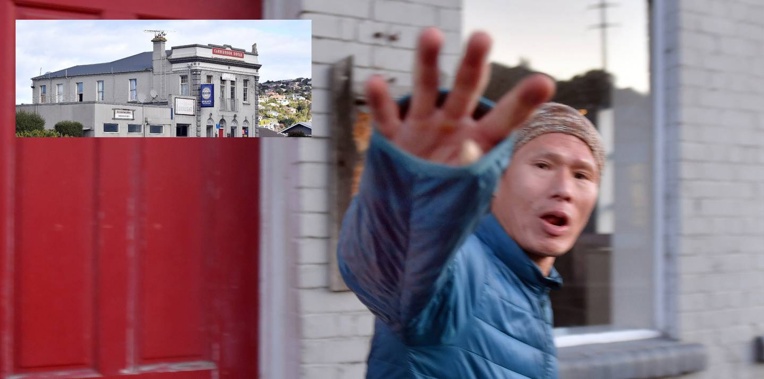
The former Carisbrook Hotel has been branded by the Government “not a suitable option” for emergency accommodation and the Ministry of Social Development has stopped refering homeless people to its rooms.
The announcement comes after the Otago Daily Times exposed the Carisbrook’s appalling facilities as one of the city’s “Houses of Horror”.
Local government officials have also swarmed to the Carisbrook this week to scrutinise its compliance with building standards and tenancy rules.
A Dunedin City Council spokesman said building owner Jacky Cheung had come under the spotlight of both the council and Tenancy Services, which is part of the Ministry of Business, Innovation and Employment.
Officials had “discussed concerns” with Cheung — and issued him with a “notice to fix”.
/cloudfront-ap-southeast-2.images.arcpublishing.com/nzme/PQPK57WIX5HEJGNS6HPFLPYCZE.jpg)
Work and Income payments are funding Carisbrook rooms for the homeless without beds, nor a communal cooker or fridge — at extortionate rates. Photo / Stephen Jaquiery
A further “site visit” would be undertaken today, and council staff were working with support agencies to “consider the needs” of people living there.
The Otago Daily Times exposed the Carisbrook slumlord for housing vulnerable homeless people in bare rooms without facilities. People were sleeping on the floor — with no beds or heaters provided and no cooking facilities.
Cheung said his rental income came from homeless people’s benefits, paid to him directly by the Ministry of Social Development (MSD) agency Work and Income.
The MSD has also now admitted it had pointed at least one homeless person to the Caversham horror house.
MSD regional commissioner Steph Voight said the role of the MSD was to “identify a suitable accommodation supplier” based on homeless people’s “particular needs and what [was] available at the time”.
/cloudfront-ap-southeast-2.images.arcpublishing.com/nzme/VSFQN4BFKZHANO2EEWMUDFJ5NQ.jpg)
Bedding on the floor of the former Carisbrook Hotel. Photo / Stephen Jaquiery
“We were made aware that the Carisbrook Hotel had accommodation available, so this was mentioned to at least one person as an option.
“Once we became aware of complaints about the condition of the hotel, we immediately ensured all staff were aware that it was not a suitable option,” she said.
Work and Income funds “emergency housing” for homeless people that can be paid for up to seven nights at a time, to a maximum of 21 nights.
This short-term accommodation was “usually in motels”, the ministry said.
However, the Otago Daily Times reported last week that homeless people might not then progress to safe homes with the support they needed.
Many people with serious illnesses and addictions were stuck in dilapidated multi-occupancy boarding houses, sustained by rents paid directly by Work and Income to the slum landlords.
At the Carisbrook, Cheung was still willing to house people on benefits paid for by Work and Income — and had put his prices up.
Yesterday, the Otago Daily Times rang Cheung and he offered a single-occupancy room for $280 a week. Last week, he quoted $250 a week, or $400 for a couple.
/cloudfront-ap-southeast-2.images.arcpublishing.com/nzme/RKM24U4JUFBKVLSAZEUU2CLYQI.jpg)
Cupboards hang off their hinges in a kitchen area in a room of the former Carisbrook Hotel. Photo / Stephen Jaquiery
He was asked if Work and Income payments could be used.
“Yes, yes, yes. Tell Work and Income to call me. I am registered. Yes, go to Work and Income,” Cheung said.
He then ended the call abruptly.
When contacted for a response to the MSD’s decision to no longer point people to the Carisbrook, Cheung said: “I don’t want to talk”.
However, he then rang back and asked that the Otago Daily Times “please stop advertising the building”.
“I don’t want to be in the newspaper at all.”
Later, when the Otago Daily Times visited the building, he said: “No publicity!”.
When asked if he still had people in the building, he said: “Only one, two, three.”
Night Shelter community worker Chris Edwards said she was “shocked to the bone” that the building was still open and housing people — and that the rent had been put up.
“What we absolutely need in this city — and country — is supported social housing.
/cloudfront-ap-southeast-2.images.arcpublishing.com/nzme/NXCCGKML7BDY5N5IFVDAU4BJHY.jpg)
Community worker Chris Edwards had been referring emergency homeless people to the former Carisbrook Hotel because it is safer than living on the street. Photo / Stephen Jaquiery
“It is to New Zealand’s shame that we put such vulnerable people in such disgusting accommodation.”
Last week, Cheung told the Otago Daily Times his vulnerable homeless tenants could be “very bad” but so long as they were not violent, it did not matter what they were doing.
A man was facing a charge of intent to intimidate Cheung with a threat of injury.
Responding to the news of the charge, Edwards said it seemed the landlord was “out of his depth in every way imaginable”.
If the charge was against a homeless person, it would only reduce their chances of being taken on by a better landlord, “compounding” their homeless situation, she said.
- Mary Williams, ODT
Take your Radio, Podcasts and Music with you









